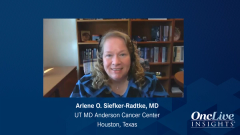
Repeat Molecular Testing in Metastatic Urothelial Cancer
Current recommendations for repeat testing in patients with relapsed metastatic urothelial cancer.
Episodes in this series

Arlene O. Siefker-Radtke, MD: This patient receives split-dose cisplatin and, after having response to therapy, is placed on maintenance avelumab [Bavencio]. Unfortunately, 6 months later, he has progression on imaging. What would you do at that point? You know he has an FGFR3 [fibroblast growth factor receptor 3] alteration based on prior tissue. Would you retest tissue? Would you move on to FGF-targeted therapy? Or would you consider an alternative at this point?
Scott T. Tagawa, MD, MS, FACP: I always consider repeat testing. I don’t know that I would do it in this case. I guess it would depend on his pattern of progression. Is there a new site? Do I think it’s different? And if I recall correctly, it was the primary that was tested, not a metastatic site. But at least for FGFR, I’m confident that is likely to be more of a truncal alteration in there, in all of the sites. I would trust that. We don’t have randomized data between FGFR-targeted therapy and, let’s say, nectin-4-targeted therapy with enfortumab vedotin [Padcev]. Those are the 2 main treatment options as I see it. On one hand, I can say, “There’s randomized data against old-fashioned chemotherapy,” but randomized data for enfortumab vedotin, so level 1 data there, versus only, at least what we have so far, nonrandomized data for erdafitinib [Balversa]. But I’m of the mindset of targeted therapy first when available. Unless there was some clinical reason that I’m worried about toxicity, particularly, or a practical basis, such as high copays for an oral medicine and no copays for an intravenous [IV] medicine, something like that. I would probably go with erdafitinib next and think, “I will have an antibody-drug conjugate after that should they need it.”
Arlene O. Siefker-Radtke, MD: And with both, we’ve seen good response rates; the data with enfortumab vedotin suggesting a 40% objective response rate; the single-arm phase 2 trial with erdafitinib, again, a 40% response rate. Both have seen responses in liver metastases that were similar to non-liver, visceral versus non-visceral. They’re good cytoreductive strategies. And just to share my insights from one patient I treated on the trial, who had rapidly progressive liver metastases. When I enrolled him on the trial, he told me, “Doc, I feel like I’m dying. I have small children at home. If I don’t feel better in 2 weeks, I’m not coming back because I need to spend time with my children.” And I told him at that time, if you’re not feeling better, don’t come back. It’s clearly not working. Because we typically see cytoreduction very quickly, within 1 to 2 weeks of starting therapy. And sure enough, 2 weeks later, he returned. He had an overall 82% reduction in his very extensive liver metastases by RECIST [Response Evaluation Criteria in Solid Tumors] criteria. And he was grateful for the additional time that we were able to buy him. And this was before we had approval of enfortumab vedotin. There was also some intriguing—an intriguing abstract presented—looking at patients enrolled on enfortumab vedotin trials, where they looked at the impact of FGFR3 alterations. And there did seem to be some hints that those patients treated with erdafitinib first may do a little better than those treated with enfortumab vedotin first. Although the data set was rather small and it’s hard to provide any definitive statements. That’s more hypothesis generation, but it’s interesting to consider how different biologies might be impacted by different mutations. And perhaps over time, we’ll be devising optimal sequences of therapy based on a personalized strategy targeting each patient’s individual tumor.
Transcript edited for clarity.



































